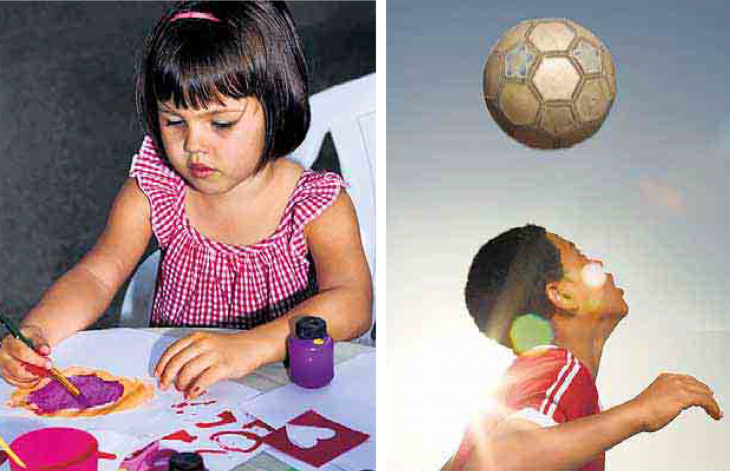As a young boy, he spent all his time on the playground and was often coaxed to come home for meals. In school, he got an experienced coach under whose guidance his passion for the game reached a peak. With passion, talent and support from parents and coach, he achieved what was unimaginable then, becoming the greatest cricketer in the world.
Sachin Tendulkar, it appears had initially failed in his board exams – a trivial fact of life which didn’t come in the way of his pursuit of cricketing passion. The success though, didn’t come easy. His hard work at the nets and dedication is truly an inspiring story of realising one’s dreams.
A R Rahman, the legendary musician dropped out of school to pursue his passion and it was his mother who stood behind him, encouraging him. Talent is there all around us, though not all children are lucky to get supportive parents and committed mentors.
Asha displayed creativity in drawing, from her early years. She demonstrated application of ideas and concepts into producing great designs. Growing up, she dreamt of pursuing a career in fashion designing.
Similar are the cases of Bhavani, a talented dancer whose dream was to be a choreographer, or Rakesh, who wanted to be a football player or Dhanush, whose dream was to be a musician. All these children were part of a class studying science and mathematics – subjects they very much disliked.
Parents consider it a major responsibility to enable their children build a h4 career. However, their mindset is to look at traditional courses like engineering or medicine to be a h4 career, influencing children to pursue them.
The options for diversified and offbeat careers have multiplied and the career scope has grown immensely, but most parents are unwilling to be convinced. Therefore, children should understand and manage their talent better and parents should play a supportive role, encouraging and nurturing talent.
Discovering talent
Talent is a capability or skill, which comes naturally to do a task with ease or excellence, with minimum effort. Identifying and classifying your skills as below is the first step in managing your talent:
- Academic: science; mathematics; computers.
- Artistic: fine arts, performing arts
- Life skills: languages, verbal skills, interpersonal skills
- Other skills: visio-spatial, sports, athletics
It is pertinent to understand these skills are not mutually exclusive and that children may have multiple, complementing skills.
Talent Assessment
A student-counseling center or an online test is a good option to understand talent, strengths and aptitude.
The process is simple and revolves around answering a series of multiple-choice questions that encompass:
- Aptitude assessment
- Personality assessment
- Interest assessment
- Analysis of the test results
- Reports
- Conclusion/ recommendation
Talent and aptitude can be in areas like abstract, numerical, verbal, creative etc. and experts at the counseling centers analyse the test results and arrive at their recommendations of careers and courses.
Managing talent
While talent assessment reveals your strengths, you have to consider whether it matches with your dreams and passion. A career typically lasts for 30-40 years and you have to enjoy being in the profession of your choice.
Alternatively, you can also make a smart choice of pursuing your passion in addition to selecting a regular career.
Managing talent should follow this direction
- Understand your talent, aptitude and interests.
- Consider career and course options to match the above.
- Evaluate career options from long-term perspective and whether you will enjoy being in that career for rest of your life.
- Evaluate the benefits and challenges of mainstream and offbeat careers and decide the right course.
- Connect your talent to academic and professional goals, developing an appropriate learning strategy.
- Don’t give up your hidden talent or a natural aptitude in case you choose a different course/ career; pursue it with vigor balancing between the demands of a professional course, time and resources.
- Today, career options are unlimited, allowing you to find a path which works for you. Between mainstream and offbeat careers, there’s indeed wide spectrum of options to suit every mind. Few prominent offbeat courses include acting, direction, music, journalism and content management, Restaurants and catering, animation and design, entrepreneurship, sports, health and fitness.
Role of parents and children
In the Indian context, the role of parents is critical for a student’s career choice and professional development. Parents should focus more on facilitating children to get into a profession where they will be happy and satisfied.
Towards this endeavor, children should be more convincing and assertive and parents must be willing to listen and open to new ideas.
Sir Ken Robinson, a leading thinker and speaker, in his breakthrough book, The element talks about the point at which natural talent meets personal passion, leading to extraordinary professional achievements.
Today’s plethora of opportunities provides an opportunity for a Doctor’s son to be Musician, a Professor’s daughter to be a Bharatanatyam dancer and perhaps, there are several Sachins’ in the making. Life is all about making the right choices to achieve your dreams. Follow your dream; success follows.

